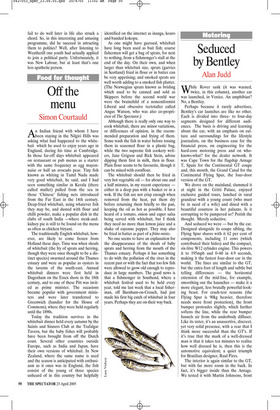Voter apathy
Michael Vestey
When I was asked last week who I thought would win the general election, I didn’t have a clue. This is such a peculiar election that few are prepared to predict confidently its outcome. With opinion polls all over the place it could go either way. Much seems to depend on turnout, as well as on postal voting results now that the governing party of Britain has decided that ballot-rigging is the perfect solution to apathy among Labour voters.
Apathy is an interesting phenomenon: is it the result of voters perceiving that however they vote it won’t make the slightest difference as the politicians will ignore them anyway? Or is it something to do with the realisation that, as more than 50 per cent of our laws are made in Brussels by unelected people, voting for British political parties is now meaningless?
I don’t know. Bernard, now Lord Weatherill, the former Speaker of the Commons, made heroic efforts to enthuse a group of sixth-formers to vote in future elections and to take an interest in politics in The Age Gap on Radio Four this week (Monday). It was rather a good idea and turned out to be much better than I had thought it might be. Weatherill, an energetic 83-year-old, and his producer Sally Flatman, went along to Coulsdon College in Croydon to see if the students were interested in politics. He found, not surprisingly among that age group, a certain amount of apathy and stereotypical ideas about Parliament, i.e., that it was filled with grumpy old men who couldn’t relate to the young. That may well be the case but the young also have to try to relate to their elders, something most seem unwilling to do. Anyway, Weatherill engaged with them in an unstuffy and humorous way, and succeeded in winning most of them round.
He told them of his own background: he left public school at 17 because he hated it, went to Sandhurst and joined the Bengal Lancers. Then it was straight into his father’s tailoring firm. The chairman of his local Conservative party in Guildford persuaded him to enter politics, which he did as MP for a Croydon constituency. Later, he became deputy chief whip under Margaret Thatcher. The sixth-formers, who seemed to be an intelligent bunch, which is rather reassuring these days, asked him how Parliament had changed in recent years. He thought that what disfigured the Commons was Prime Minister’s Questions, which was now yah-boo politics and not about answering questions. This is true, of course, but he didn’t add that the reason for this is that we have the most blatant liar in No. 10 in the entire history of such incumbents, ahead even of Edward Heath. Having said that, at least his performance at PMQs confirms that week after week, so perhaps it does have some value.
On the subject of apathy, Weatherill described it as the greatest enemy of freedom. How true, as we’ve seen with the increasing power of the EU. He quoted Plato: ‘The penalty that good men pay for failing to participate in public affairs is to be governed by others worse than themselves.’ He escorted them on a tour of Parliament and sharply reminded them of the dress code: ‘Reasonably smart, please. Not jeans,’ which caused a minor problem for one of the students. One girl was overwhelmed by the beauty of the Palace, noting that you could get good money for some of its treasures. A boy wanted to tear it all down and enclose Parliament in a modern building that today’s youth might ‘relate’ to.
Weatherill was asked what whips were — the parliamentary variety, that is — and he explained that they were there to keep the Prime Minister informed of backbench opinion and vice versa. Wisely perhaps, for these young heads, he omitted that their role was also to bully, browbeat and threaten backbenchers with punishments short of being hung, drawn and quartered for failing to support their leaderships. Overall, Weatherill was a hit with the sixth-formers. They also thought he was quite humble, too, having been told that he still carries his old tailor’s thimble with him everywhere just to remind himself to keep pomposity and self-importance at bay. His belief that people like himself who had failed at school didn’t necessarily fail to do well later in life also struck a chord. So, in this interesting and amusing programme, did he succeed in attracting them to politics? Well, after listening to Weatherill one youth had actually applied to join a political party. Unfortunately, it was New Labour, but at least that’s one less apathetic person.




















































 Previous page
Previous page